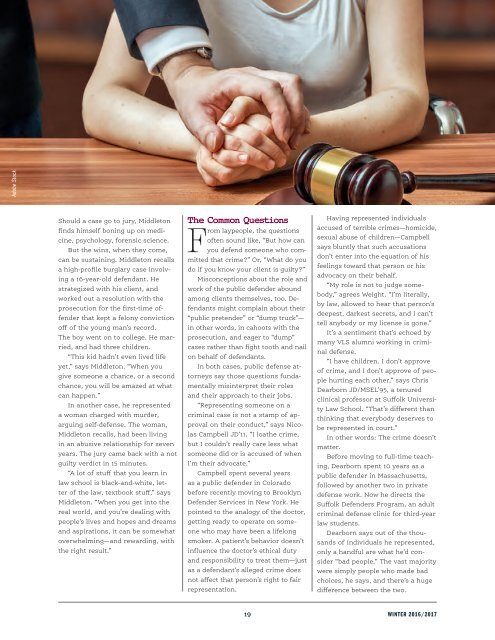In search of justice
fall2016_web
fall2016_web
Create successful ePaper yourself
Turn your PDF publications into a flip-book with our unique Google optimized e-Paper software.
Adobe Stock<br />
Should a case go to jury, Middleton<br />
finds himself boning up on medicine,<br />
psychology, forensic science.<br />
But the wins, when they come,<br />
can be sustaining. Middleton recalls<br />
a high-pr<strong>of</strong>ile burglary case involving<br />
a 16-year-old defendant. He<br />
strategized with his client, and<br />
worked out a resolution with the<br />
prosecution for the first-time <strong>of</strong>fender<br />
that kept a felony conviction<br />
<strong>of</strong>f <strong>of</strong> the young man’s record.<br />
The boy went on to college. He married,<br />
and had three children.<br />
“This kid hadn’t even lived life<br />
yet,” says Middleton. “When you<br />
give someone a chance, or a second<br />
chance, you will be amazed at what<br />
can happen.”<br />
<strong>In</strong> another case, he represented<br />
a woman charged with murder,<br />
arguing self-defense. The woman,<br />
Middleton recalls, had been living<br />
in an abusive relationship for seven<br />
years. The jury came back with a not<br />
guilty verdict in 15 minutes.<br />
“A lot <strong>of</strong> stuff that you learn in<br />
law school is black-and-white, letter<br />
<strong>of</strong> the law, textbook stuff,” says<br />
Middleton. “When you get into the<br />
real world, and you’re dealing with<br />
people’s lives and hopes and dreams<br />
and aspirations, it can be somewhat<br />
overwhelming—and rewarding, with<br />
the right result.”<br />
The Common Questions<br />
From laypeople, the questions<br />
<strong>of</strong>ten sound like, “But how can<br />
you defend someone who committed<br />
that crime?” Or, “What do you<br />
do if you know your client is guilty?”<br />
Misconceptions about the role and<br />
work <strong>of</strong> the public defender abound<br />
among clients themselves, too. Defendants<br />
might complain about their<br />
“public pretender” or “dump truck”—<br />
in other words, in cahoots with the<br />
prosecution, and eager to “dump”<br />
cases rather than fight tooth and nail<br />
on behalf <strong>of</strong> defendants.<br />
<strong>In</strong> both cases, public defense attorneys<br />
say those questions fundamentally<br />
misinterpret their roles<br />
and their approach to their jobs.<br />
“Representing someone on a<br />
criminal case is not a stamp <strong>of</strong> approval<br />
on their conduct,” says Nicolas<br />
Campbell JD’11. “I loathe crime,<br />
but I couldn’t really care less what<br />
someone did or is accused <strong>of</strong> when<br />
I’m their advocate.”<br />
Campbell spent several years<br />
as a public defender in Colorado<br />
before recently moving to Brooklyn<br />
Defender Services in New York. He<br />
pointed to the analogy <strong>of</strong> the doctor,<br />
getting ready to operate on someone<br />
who may have been a lifelong<br />
smoker. A patient’s behavior doesn’t<br />
influence the doctor’s ethical duty<br />
and responsibility to treat them—just<br />
as a defendant’s alleged crime does<br />
not affect that person’s right to fair<br />
representation.<br />
Having represented individuals<br />
accused <strong>of</strong> terrible crimes—homicide,<br />
sexual abuse <strong>of</strong> children—Campbell<br />
says bluntly that such accusations<br />
don’t enter into the equation <strong>of</strong> his<br />
feelings toward that person or his<br />
advocacy on their behalf.<br />
“My role is not to judge somebody,”<br />
agrees Weight. “I’m literally,<br />
by law, allowed to hear that person’s<br />
deepest, darkest secrets, and I can’t<br />
tell anybody or my license is gone.”<br />
It’s a sentiment that’s echoed by<br />
many VLS alumni working in criminal<br />
defense.<br />
“I have children. I don’t approve<br />
<strong>of</strong> crime, and I don’t approve <strong>of</strong> people<br />
hurting each other,” says Chris<br />
Dearborn JD/MSEL’95, a tenured<br />
clinical pr<strong>of</strong>essor at Suffolk University<br />
Law School. “That’s different than<br />
thinking that everybody deserves to<br />
be represented in court.”<br />
<strong>In</strong> other words: The crime doesn’t<br />
matter.<br />
Before moving to full-time teaching,<br />
Dearborn spent 10 years as a<br />
public defender in Massachusetts,<br />
followed by another two in private<br />
defense work. Now he directs the<br />
Suffolk Defenders Program, an adult<br />
criminal defense clinic for third-year<br />
law students.<br />
Dearborn says out <strong>of</strong> the thousands<br />
<strong>of</strong> individuals he represented,<br />
only a handful are what he’d consider<br />
“bad people.” The vast majority<br />
were simply people who made bad<br />
choices, he says, and there’s a huge<br />
difference between the two.<br />
19 WINTER 2016/2017


